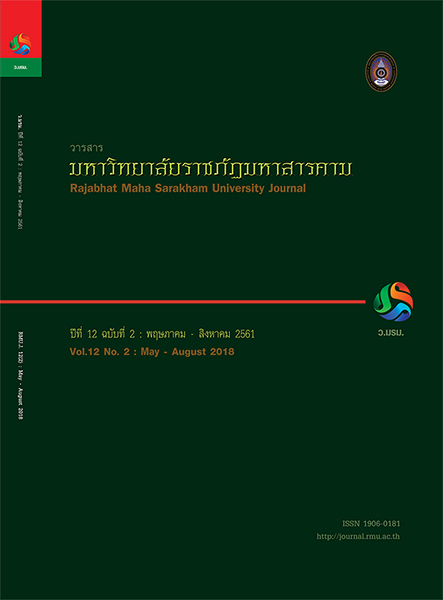การพัฒนาตัวบ่งชี้ภาวะผู้นำทางวิชาการของผู้บริหารสถานศึกษาระดับประถมศึกษาในศตวรรษที่ 21 สังกัดสำนักงานคณะกรรมการการศึกษาขั้นพื้นฐานในภาคตะวันออกเฉียงเหนือ
Main Article Content
บทคัดย่อ
การวจิ ยั ครงั้ นี้มวี ัตถุประสงคเ์ พื่อพฒั นาตัวบ่งชภี้ าวะผนู้ ำทางวชิ าการของผ้บู รหิ ารสถานศึกษาระดับประถมศกึ ษาในศตวรรษที่ 21
สังกัดสำนักงานคณะกรรมการการศึกษาขั้นพื้นฐานในภาคตะวันออกเฉียงเหนือ โดยการสังเคราะห์เอกสาร และสัมภาษณ์ผู้เชี่ยวชาญ
จำนวน 9 คน แลว้ นำผลการสัมภาษณม์ าจัดระเบยี บขอ้ มลู พรรณนาหรือแสดงขอ้ มลู สรุปและตคี วามประเด็น จากนัน้ ทำการสงั เคราะห์
เป็นตัวบ่งชี้ภาวะผู้นำทางวิชาการของผู้บริหารสถานศึกษาระดับประถมศึกษาในศตวรรษที่ 21 สังกัดสำนักงานคณะกรรมการการศึกษา
ขั้นพื้นฐานในภาคตะวันออกเฉียงเหนือ ผลการวิจัยพบว่า
ตัวบ่งชี้ภาวะผู้นำทางวิชาการของผู้บริหารสถานศึกษาระดับประถมศึกษาในศตวรรษที่21 สังกัดสำนักงานคณะกรรมการการ
ศึกษาขั้นพื้นฐานในภาคตะวันออกเฉียงเหนือ ประกอบด้วย องค์ประกอบหลัก 6 องค์ประกอบ องค์ประกอบย่อย 25 องค์ประกอบ
และตัวบ่งชี้ 124 ตัวบ่งชี้ ได้แก่ 1) ด้านการพัฒนาหลักสูตรและกระบวนการเรียนรู้ มีจำนวน 3 องค์ประกอบย่อย คือ การบริหาร
หลักสูตร การส่งเสริมการเรียนรู้ในศตวรรษที่ 21 และการวัดและประเมินผล และมีตัวบ่งชี้ จำนวน 19 ตัวบ่งชี้ 2) ด้านการพัฒนา
ครูสู่มืออาชีพ มีจำนวน 4 องค์ประกอบย่อย คือ การพัฒนาสมรรถนะครู การสร้างชุมชนแห่งการเรียนรู้ การสอนงาน และการสร้าง
แรงบันดาลใจ และมีตัวบ่งชี้ จำนวน 23 ตัวบ่งชี้ 3) ด้านการมีวิสัยทัศน์ มีจำนวน 5 องค์ประกอบย่อย คือ การวิเคราะห์ภารกิจของ
สถานศึกษา การกำหนดเป้าหมายของสถานศึกษา การรับผิดชอบและการตัดสินใจ การบริหารทรัพยากรทางวิชาการ และการพัฒนา
ตนเอง และมีตัวบ่งชี้ จำนวน 22 ตัวบ่งชี้ 4) ด้านการทำงานเป็นทีม มีจำนวน 5 องค์ประกอบย่อย คือ การบริหารแบบมีส่วนร่วม
การปรับตัวเข้ากับสถานการณ์ การสื่อสาร การสร้างบรรยากาศการทำงาน และการเสริมแรงและมีตัวบ่งชี้ จำนวน 25 ตัวบ่งชี้ 5) ด้าน
การพัฒนานวัตกรรมทางวิชาการ มีจำนวน 3 องค์ประกอบย่อยคือ การผลิตนวัตกรรมการใช้นวัตกรรมและเทคโนโลยีทางวิชาการ และ
การจัดการความรู้ และมีตัวบ่งชี้ จำนวน 15 ตัวบ่งชี้และ 6) ด้านการพัฒนากระบวนการคิด มีจำนวน 5 องค์ประกอบย่อยคือ การคิด
สร้างสรรค์ การคิดเชิงวิพากษ์ การคิดวิเคราะห์ การคิดเชิงระบบ และการคิดตั้งคำถาม และมีตัวบ่งชี้ จำนวน 20 ตัวบ่งชี้
Article Details
1. บทความที่ลงตีพิมพ์ทุกเรื่องได้รับการตรวจทางวิชาการโดยผู้ประเมินอิสระ ผู้ทรงคุณวุฒิ (Peer Review) สาขาที่เกี่ยวข้อง อย่างน้อย 3 ท่าน ในรูปแบบ Double blind review
2. ข้อคิดเห็นใด ๆ ของบทความที่ลงตีพิมพ์ในวารสารมหาวิทยาลัยราชภัฏมหาสารคาม นี้เป็นของผู้เขียน คณะผู้จัดทำวารสารไม่จำเป็นต้องเห็นด้วย
3. กองบรรณาธิการวารสารมหาวิทยาลัยราชภัฏมหาสารคาม ไม่สงวนสิทธิ์การคัดลอกแต่ให้อ้างอิงแสดงที่มา
เอกสารอ้างอิง
California: Sage publications, Inc.
[2] Lunenburg, F.C. (2012). Educational
administration. 6th ed. Cengage learning
international offices: Linda Schreiber-ganster.
[3] VicharnPanich (2014). Education
administration in 21st century.
6th national seminar of Ph.d
(pp.1). Computer center, Loei
University.
[4] Fowler, F.C. (2013). Policy
studies for educational leaders.
4th ed. Burlington: Pearson
education, Inc.
[5] Kay, K., & Greenhill, V. (2013).
The leader’s guide to 21st
century education. Burlington:
Pearson education, Inc.
[6] Owings, W.G., & Kaplan, L.S.
(2012). Leadership and
organizational behavior in
education. Burlington: Pearson
education, Inc.
[7] Paitoon Sinlarat. (2014). For the
excellence of Thai edcation.
Bangkok: DhurakijBundit
University.
[8] Office of the education council
(2014). The report of thesis for
the ways to develop Thai
education and prepare for 21st
century. Bangkok: Ministry of
education.
[9] Reeves, D.B. (2011). Finding
your leadership focus. New
York : Columbia University.
[10] Alexander, N.A. (2013). Policy
analysis for educational leaders.
Burlington:Pearson education,
Inc.
[11] WirotSanrattana. (2014). New paradigm : The
case of education in 21st century. Bangkok:
Tippayapisut, Inc.
[12] Jaranee Kao-ion. (2014). Instrucional
management techniques in schools : The
strategies and guidelines for professional
principals. 2nded. Songkhla: Yala University.
[13] Preeyaporn Wongsanutrochn. (2010).
Instructional management. Bangkok :
Research center for vocational Education
promotion.
[14] Suwimol Wongwanich. (2015).
The evaluation research for essential needs.
3rd ed. Bangkok: Chulalongkorn University.
[15] Taweesak Nopkesorn. (2006). Qualitative
research methods book 2. Nakhonratchasima:
Chocharoenmarketing, Inc.
[16] Bernier, A.N. (2015). Designing a systems
based curriculum to develop 21st century
sustainability literacy and communication
skills. Doctor of philosophy, Prescott College.
[17] Embry,K.A. (2015). The transfer of learning
process: from online faculty development to
the college classroom. Doctor of philosophy,
Capella University.
[18] Hovious, A.S. (2015). Digital games for 21st
century learning : teacher lebrarians’beliefs
and practices. Doctor of science, University of North Dakota.
[19] Lindsey, L.A. (2015). Preparing teacher
candidates for 21st century classrooms: a study
of digital citizenship. Doctor of education,
Arizona State University.
[20] Rescigno, R.W. (2015). A case study of the
launch of Delaware's vision network: an
initiative of vision 2015. Doctor of education,
Wilmington University.
[21] Wawro, T. (2015). Impact of
voices, ideas, vision, action
exchange for teachers in
educational policies of Iowa.
Doctor of education, Walden
University.
[22] Winston, C.L. (2011).
Teamwork and collaborative
capacity. Doctor of education,
Royal Roads University.
[23] Hixson, K. (2013). Developing
and evaluating computer-based
teamwork skills training for
long-duration spaceflight crews.
Doctor of philosophy, Nova
Southeastern University.
[24] Office of the education council.
(2009). Innovation research
and development report for
organizational optimization
education with knowledge management.
Bangkok: Ministry of education.
[25] Thanita Nopparit. (2013). Administrational
innovation of information technology and
communication in dream schools. Doctor of
education, Silpakorn University.
[26] Lopez, G. (2014). The role of system thinking
development and experiential learning on
enterprise transformation. Doctor of
philosophy, Johns Hopkins University.
[27] Kriengsak Chareonwongsak. (2012). Futuristic
thinking. 5thed. Bangkok: Success Media,
Inc.


